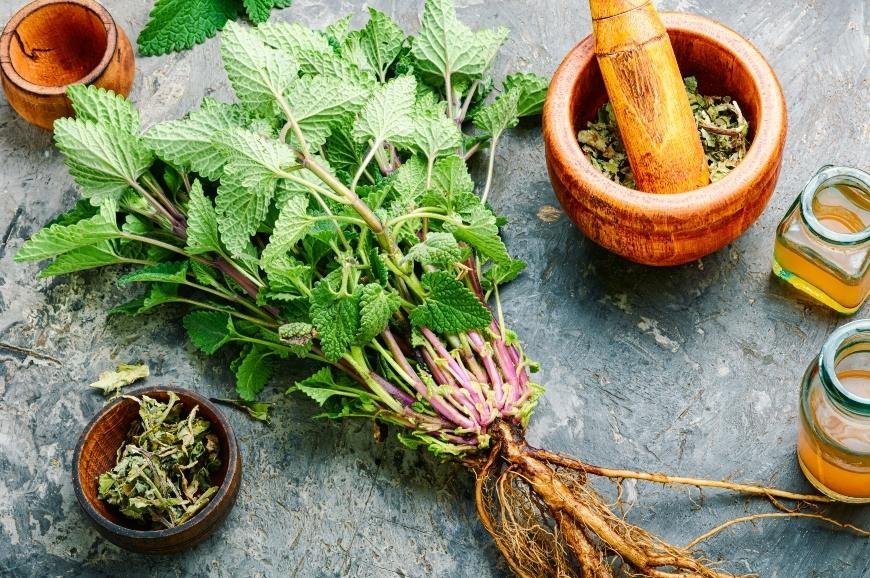What is Lemon Balm
Learn what Lemon Balm is - uncover its history, uses, effects, benefits, and potential side effects in our comprehensive guide.

What is Lemon Balm? This intriguing herb has piqued the curiosity of many young adults seeking to explore its potential uses and effects. As an expert in this field, I am excited to share my extensive knowledge on this fascinating plant.
This article will investigate the roots and traditional uses of this captivating herb, delving into its past. We will then discuss various uses of lemon balm, from soothing cold sores with its antimicrobial properties to combining it with other substances for recreational purposes.
We'll also examine the effects of lemon balm essence on the human body and mind, as well as any potential side effects that may arise from consumption. Lastly, we will address safety concerns surrounding lemon balm combined with other substances before concluding our exploration into what is Lemon Balm.
Table of Contents:
- What is Lemon Balm?
- A Brief Overview of Lemon Balm
- History of Lemon Balm
- Uses of Lemon Balm
- Effects of Lemon Balm
- Side Effects of Lemon Balm
- Conclusion on Lemon Balm
- Frequently Asked Questions What is Lemon Balm
- Conclusion
What is Lemon Balm?
Lemon balm, scientifically known as Melissa officinalis, is a perennial herb from the mint family. It's native to various places, including Europe, North Africa and West Asia, but has been spread elsewhere. This versatile plant boasts an array of uses ranging from culinary to medicinal applications. Its leaves have a distinct lemony scent that makes it popular among gardeners and herbal enthusiasts alike.
As youthful adults curious about investigating various substances for recreational or therapeutic purposes, it is essential to be aware of what lemon balm is and how it can be utilized securely. To better understand the history, effects, and safety of lemon balm, this article will provide a comprehensive overview.
A Brief Overview of Lemon Balm
- Botanical Name: Melissa officinalis
- Family: Lamiaceae (Mint)
- Nativity: Europe, North Africa & West Asia
- Growth Habit: Perennial herb with square stems & opposite leaves
- Scent Profile: Distinctly lemony aroma due to volatile oils present in its leaves
The versatility of lemon balm doesn't end there - many people enjoy incorporating this fragrant herb into their daily lives through various means such as teas or aromatherapy products like candles or essential oils. If you're curious about trying out some new herbs for your personal use at home or just want more information on this fascinating plant species before diving headfirst into experimenting with its benefits yourself - read on.
Lemon balm, a fragrant herb from the mint family with centuries-long usage for medicinal purposes, offers an exquisite taste and scent when added to teas, salads or other recipes. Lemon balm's distinctive taste and scent make it a great enhancement to teas, salads, and other culinary creations. Moving on from its history, let's explore how lemon balm can be beneficial today.
History of Lemon Balm

Lemon balm, scientifically known as Melissa officinalis, has a rich history dating back over 2000 years. This perennial herb from the mint family is native to Europe, North Africa, and West Asia but has since been cultivated worldwide due to its numerous medicinal properties.
The moniker "Melissa" originates from the Greek term for honeybee, which is drawn to this plant's sweet-smelling blossoms. In ancient Greece and Rome, lemon balm was used not only for its soothing aroma but also for various medicinal purposes. The famous physician Dioscorides mentioned it in his work "De Materia Medica", where he described its use in treating wounds and insect bites.
- Ancient Greeks: They believed that lemon balm could help improve memory and increase longevity. It was often planted near beehives to attract more bees and produce better quality honey.
- Roman Empire: Romans utilized lemon balm as an herbal remedy for digestive issues, insomnia, anxiety, and depression.
- Middle Ages: During this time period, European monks grew lemon balm in their monastery gardens for both culinary and medicinal uses. It became a popular ingredient in many traditional remedies such as Carmelite water - a concoction made with alcohol infused with various herbs including lemon balm - which was believed to alleviate nervous disorders.
- Renaissance Era: Swiss physician Paracelsus praised the herb's ability to restore health by strengthening vital spirits within the body.
In addition to these historical uses of lemon balm, the herb has also been associated with folklore and mythology. For example, it was believed to have magical properties that could ward off evil spirits or bring love and happiness when planted near one's home.
Today, lemon balm is still widely used for its calming properties to treat a variety of ailments such as anxiety, insomnia, indigestion and more. Its calming effects make it an attractive option for those seeking natural alternatives to pharmaceutical drugs.
Uses of Lemon Balm
Lemon balm, scientifically known as Melissa officinalis, is a versatile herb with numerous applications in both traditional and modern medicine. Its soothing properties make it an ideal choice for treating various ailments, ranging from anxiety to indigestion. Let's explore some of the most common uses of lemon balm:
Anxiety Relief
Research has revealed that taking a lemon balm extract may help lessen anxiety levels and lift one's spirits. A study published in Phytomedicine found that participants who took a standardized extract of lemon balm experienced reduced levels of stress and improved mood after just one dose.
Sleep Aid
If you're seeking a natural sleep aid, lemon balm could be the solution. Research has shown that this herb can help increase relaxation and promote restful sleep when taken before bedtime. In fact, a study conducted on individuals suffering from mild-to-moderate anxiety disorders and sleep disturbances revealed significant improvements in their sleep patterns after taking a combination of valerian root and lemon balm extracts.
- Note: It's important to consult your healthcare provider before using any herbal supplement as a sleep aid, especially if you're currently taking prescription medications.
Digestive Health Support
Beyond its calming effects on the mind, lemon balm also offers relief for those dealing with digestive issues such as bloating or indigestion. The herb's antispasmodic properties help relax the muscles of the gastrointestinal tract, making it an effective remedy for soothing upset stomachs and easing discomfort caused by gas or cramping.
Skin Care
Lemon balm is not only beneficial when consumed internally but also has potential advantages for your skin. Lemon balm has been used topically to treat a variety of skin conditions, such as acne, eczema and cold sores, due to its anti-inflammatory and antibacterial properties. You can find lemon balm as an essential oil or incorporated into various skincare products such as creams, balms, and salves.
In addition to these uses, lemon balm has been employed in traditional medicine practices to address other concerns like headaches, fever reduction, and even improving cognitive function. However, more research is needed to fully understand its effectiveness in these areas.
Lemon balm has a variety of uses, from culinary to medicinal. Its soothing and sedative properties make it apparent that lemon balm can be utilized in multiple ways. Moving on to the next heading - Effects of Lemon Balm - we will explore how this herb interacts with our bodies and minds when consumed or applied topically.
Effects of Lemon Balm

Lemon balm, a medicinal herb with numerous possible advantages, is renowned for its calming impact on the body and mind. This plant has been used to help alleviate stress and anxiety, improve sleep quality, and even enhance cognitive function. Let's delve further into the remarkable effects of this plant.
Calming Effects on Stress and Anxiety
One of the primary reasons people turn to lemon balm is for its ability to reduce stress and anxiety levels. Rosmarinic acid, a compound found in lemon balm, has been shown to boost GABA levels in the brain which helps reduce neuronal excitability and promote relaxation. GABA, an inhibitory neurotransmitter that helps to relax the brain by reducing its excitability, is increased in the presence of compounds like rosmarinic acid found in lemon balm.
Sleep Improvement
In addition to alleviating stress and anxiety, lemon balm can also aid those struggling with insomnia or other sleep disorders. A study conducted on individuals with mild-to-moderate sleep disturbances found that taking a combination of valerian root extract and lemon balm significantly improved their overall sleep quality compared to placebo groups.
Cognitive Function Enhancement
Beyond its calming properties, research suggests that lemon balm may also offer cognitive benefits. In one study examining adults' memory performance under laboratory-induced psychological stress conditions, participants who consumed a single dose of lemon balm extract demonstrated increased alertness, contentment levels while improving their secondary memory performance compared to those who received a placebo.
Antioxidant and Anti-inflammatory Properties
Lemon balm contains a variety of antioxidants that help to neutralize free radicals and reduce oxidative stress. Lemon balm's anti-inflammatory effects may be beneficial for those with chronic inflammatory disorders such as arthritis or asthma. A study published in the Journal of Nutrition found that lemon balm extract could inhibit the production of pro-inflammatory cytokines, further supporting its potential role in managing inflammation-related disorders.
Studies have revealed that lemon balm can be a source of relaxation, yet further exploration is necessary to gain an extensive comprehension of its effects. In spite of its potential calming properties, it's critical to be cognizant of any possible adverse reactions that may arise from consuming lemon balm - a subject we'll delve into more deeply below.
Side Effects of Lemon Balm
Lemon balm is generally considered safe for most people when consumed in moderate amounts. However, like any other substance, it may cause some side effects in certain individuals. It's essential to be aware of these potential reactions and take necessary precautions while using lemon balm.
Allergic Reactions
Some people might experience allergic reactions to lemon balm due to its plant-based nature. Symptoms can include itching, rash, or difficulty breathing. If you notice any signs of an allergic reaction after consuming lemon balm, discontinue use immediately and consult a healthcare professional.
Drowsiness and Dizziness
Consuming lemon balm can lead to drowsiness or dizziness in some users. Due to its calming properties, lemon balm may induce drowsiness or dizziness in some users; therefore, caution should be taken when engaging in activities that require alertness. To minimize this risk, avoid taking large doses before engaging in activities that require alertness such as driving or operating heavy machinery.
Possible Interactions with Medications
- Sedatives: Since lemon balm has sedative effects on its own, combining it with other sedative medications could result in excessive drowsiness or slowed central nervous system functioning. Examples include benzodiazepines (like Valium), barbiturates (such as phenobarbital), and prescription sleep aids. Consult your doctor if you are currently taking any such medications before using lemon balm.
- Thyroid medications: Lemon balm may interfere with the absorption of thyroid medications, potentially reducing their effectiveness. If you are taking medication for a thyroid condition, consult your doctor before using lemon balm to avoid potential interference with its absorption.
Pregnancy and Breastfeeding
There is limited information on the safety of lemon balm during pregnancy or breastfeeding. It may be prudent to avoid using lemon balm if pregnant or breastfeeding, without consulting a medical professional first, as no serious risks have been reported.
In general, be mindful of these potential side effects when considering adding lemon balm to your herbal repertoire. Always start with small doses and monitor how your body reacts before increasing consumption. And remember that while natural remedies can offer many benefits, they should not replace proper medical care when needed.
Although its side effects are typically minor and few, it is important to be aware of them before using lemon balm for therapeutic purposes. Nevertheless, understanding the safety profile of this herb is essential before using it for therapeutic purposes. As such, let us explore the potential risks associated with consuming lemon balm in our next heading: Safety of Lemon Balm.
Conclusion on Lemon Balm
Lemon balm, a perennial herb from the mint family, has proven itself to be a safe and effective herbal remedy with numerous potential benefits. As young adults exploring various recreational substances, it's essential to understand what lemon balm is and how it can positively impact your life.
Throughout history, lemon balm has been used as a medicinal herb for treating anxiety, insomnia, indigestion, and other ailments. Its calming effects have made it popular among those seeking natural alternatives to pharmaceutical medications.
- Anxiety relief: Research shows that lemon balm can help reduce anxiety levels by promoting relaxation in the central nervous system.
- Sleep improvement: Lemon balm may also improve sleep quality by acting as a mild sedative and helping individuals fall asleep more easily.
- Digestive aid: This versatile herb has been known to soothe gastrointestinal issues such as indigestion or bloating due to its antispasmodic properties.
In terms of safety concerns surrounding lemon balm use - when taken in recommended doses - this plant is generally considered safe. Still, some people may feel sleepy or lightheaded after taking it. It's crucial always to start with low dosages before gradually increasing them if needed while monitoring any side effects you may encounter along the way.
If you're interested in incorporating lemon balm into your daily routine for its myriad of health benefits or simply looking for an alternative substance that promotes relaxation without significant adverse effects - give this powerful little herb a try.
Frequently Asked Questions What is Lemon Balm
What is the significance of lemon balm?
Lemon balm holds significance due to its wide range of medicinal and therapeutic properties. It has been used for centuries to treat various ailments, such as anxiety, insomnia, indigestion, and cold sores. Its calming effects make it a popular ingredient in herbal teas and aromatherapy products.
Why is lemon balm called lemon balm?
Lemon balm gets its name from the pleasant citrusy aroma emitted by its leaves when crushed or rubbed. The word "balm" refers to an aromatic plant that has soothing or healing properties, which aptly describes this herb's characteristics.
What are the nutrition benefits of lemon balm?
Lemon balm contains essential nutrients like vitamins A and C, calcium, magnesium, iron and potassium. Additionally, it boasts antioxidants such as rosmarinic acid that help protect cells against damage caused by free radicals. These combined attributes contribute to overall health improvement when consumed regularly.
Biological source of Lemon Balm
The biological source of lemon balm is Melissa officinalis, a perennial herb belonging to the mint family (Lamiaceae). Native to southern Europe and Mediterranean regions,it has been cultivated worldwide for centuries.
Conclusion
In conclusion, lemon balm is a herb with an ancient history of use for medicinal and recreational purposes. Its effects can range from calming to energizing depending on the individual's reaction. While it appears to be generally safe when taken in moderation, there are potential side effects that should be considered before using this plant medicinally or recreationally. To ensure a safe and beneficial experience, it is essential to assess how your body reacts to lemon balm.






































































































































